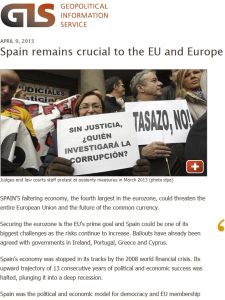Join getAbstract to access the summary!

Join getAbstract to access the summary!
Jaime Pinto
Spain Remains Crucial to the EU and Europe Despite Its Crisis
GIS, 2013
What's inside?
What is Spain’s standing in Europe? Are its economic woes putting its relationship with the European Union at risk.
Recommendation
Edmund Burke, an 18th-century philosopher, once described Spain as “a whale stranded on the coast of Europe.” Now that the nation is embroiled in the European sovereign-debt crisis, what will become of this beached giant? getAbstract recommends Jaime Pinto’s article to policy makers, investors and followers of European politics. Pinto, a historian and political writer, clearly outlines the difficulties facing the Spanish government and the implications for the euro zone. Pinto presents well-structured opinions on the importance of Spain to the European Union.
Summary
About the Author
Jaime Pinto is a historian and political writer. His works include books on Portuguese history, political science and African affairs.

















Comment on this summary